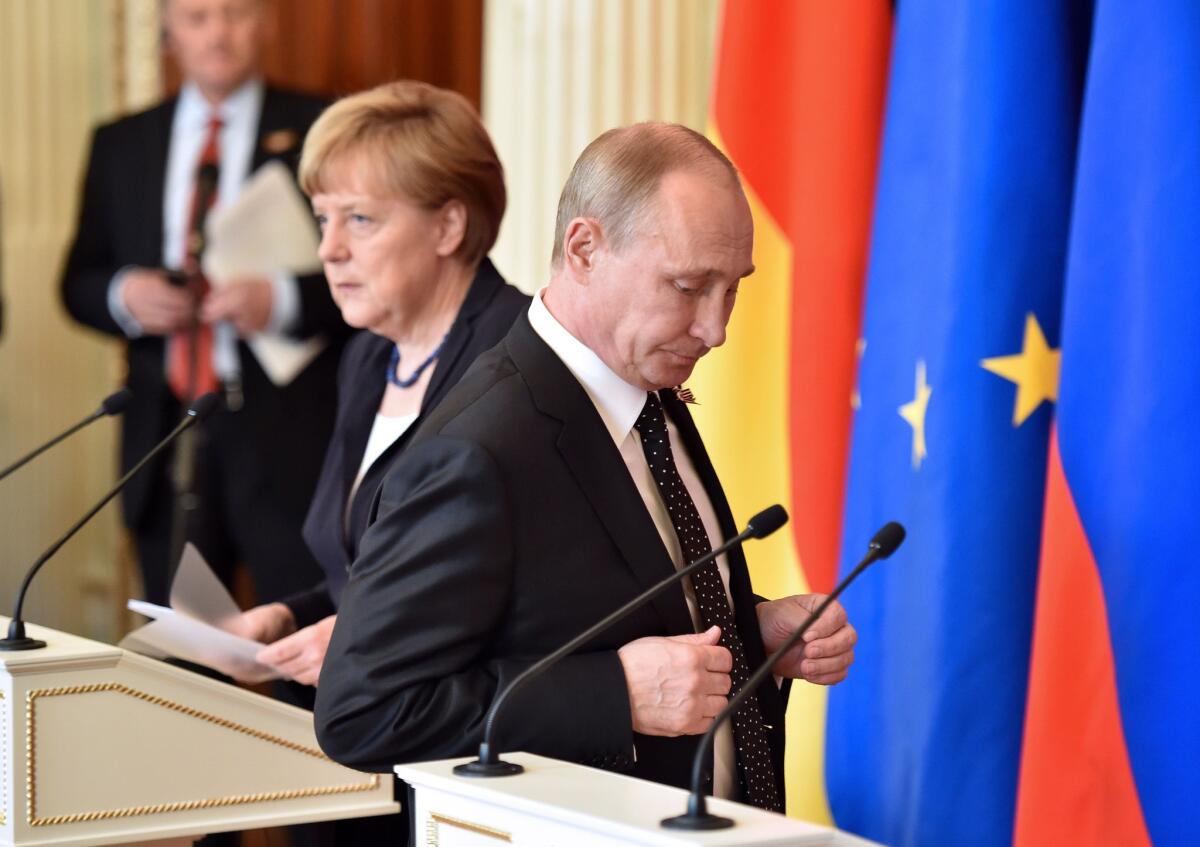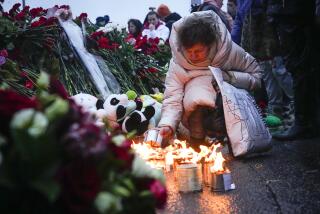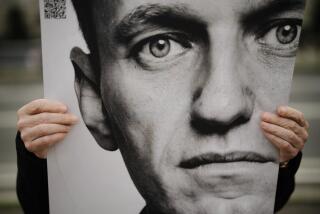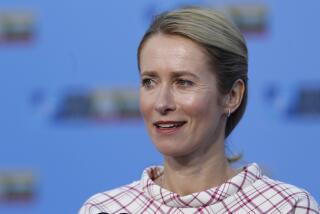Merkel visit after parade boycott does little to mend rift with Russia

German Chancellor
German Chancellor Angela Merkel visited the Kremlin on Sunday to pay respects to the millions of Soviet lives lost in World War II and to press Russian President Vladimir Putin to use his influence with pro-Russia separatists to end the deadly conflict in Ukraine.
But on the heels of a Western boycott of Russia’s massive Victory Day parade on Saturday, Merkel’s gesture appeared to do little to mend the rift that Moscow’s actions in Ukraine have inflicted on relations between Russia and the United States and Europe.
Putin accompanied Merkel in laying wreaths at the Tomb of the Unknown Soldier, then hosted her in the Kremlin for talks that were clearly dominated by the two sides’ stark differences over the legality of Russia’s annexing of Ukraine’s Crimean peninsula last year.
At a brief news conference after their meeting, Putin appeared confident and unmoved by Merkel’s argument that the seizure of Crimea was in violation of international law. He reiterated Moscow’s claim that the predominantly Russian population had a right to vote for reunion with Russia after a “coup d’etat” in Kiev ousted the elected president in February 2014.
Merkel held her ground, urging Putin to use his influence with the separatists in eastern Ukraine to “restore the sovereignty and territorial integrity” of the neighboring country where more than 6,100, many of them civilians, have been killed in little more than a year of fighting. The Kremlin leader agreed to do what he could but stated that the fate of Ukraine is in the hands of the separatists and the Kiev government, not Russia.
Both leaders pledged support for the Feb. 12 peace plan brokered in the Belarus capital of Minsk by Merkel, French President Francois Hollande and diplomats of the Organization for Security and Cooperation in Europe. But they conceded that the cease-fire and artillery pullback agreed to in the Minsk pact haven’t been honored by the combatants. Both described the diplomatic path out of the conflict as “difficult” but the only means of ending the bloodshed.
As Merkel and Putin talked, rebel leaders of the self-proclaimed Donetsk People’s Republic announced plans for a celebratory march in the eastern Ukraine city on Monday, the first anniversary of a dubious vote for independence held less than two months after Russia annexed Crimea. The march will be followed by a concert in the central Lenin Square of Donetsk, the Tass news agency reported, quoting the mayor of the artillery-blasted city that was once home to a million residents.
The separatist leaders in Donetsk and Luhansk, elected in November in unmonitored votes widely condemned as illegitimate, have declined to conform with the Minsk peace plan call for new local elections. Nor has the government in Kiev made any progress in adopting the constitutional changes called for by the accord to grant broader autonomy to the eastern regions where the Russian language is dominant but no longer accorded official status.
On Sunday, Donetsk government chief Andrei Purgin reiterated the separatists’ disregard for the peace plan in announcing that the region was “harmonizing” its laws with those of Russia in preparation for inclusion in Putin’s emerging Eurasian Economic Union. The Ukrainian government has entered into an association agreement with the European Union, with hopes of eventually gaining full membership.
Putin established the Eurasian union as an alternative to the EU, and he opposes having the European Union active in Russia’s traditional sphere of influence.
The meeting with Merkel was the last in a four-day whirlwind of diplomacy as Putin received many of the visiting heads of state and government who attended the Red Square parade, including the presidents of China, India, South Africa, Cuba, Serbia and a handful of former Soviet republics.
Putin brushed off the absence of the U.S. and Western European leaders, remarking before television cameras Saturday night that “everyone we wanted to see was here.”
He also told Czech President Milos Zeman, one of the few top European leaders to attend the parade, that the relationship trouble with the West wasn’t the fault of the Kremlin.
“It was not us who initiated the chill in relations with Europe, but I hope that thanks to politicians like you we will manage not only to revive them completely but to also move forward,” Putin told Zeman during their meeting Saturday.
Follow @cjwilliamslat for the latest international news 24/7
More to Read
Start your day right
Sign up for Essential California for news, features and recommendations from the L.A. Times and beyond in your inbox six days a week.
You may occasionally receive promotional content from the Los Angeles Times.







